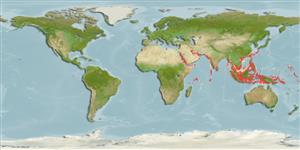分類 / Names
俗名 | 同種異名 | Catalog of Fishes(屬, 種) | ITIS | CoL | WoRMS | Cloffa
Elasmobranchii
板鰓亞綱 (鯊魚與魟魚) (sharks and rays) >
Carcharhiniformes (Ground sharks)
真鯊目 (Ground sharks) >
Hemigaleidae (Weasel sharks)
沙條鮫科 (Weasel sharks)
Etymology: Chaenogaleus: chaeno-, from chaino (Gr.), gape, referring to “rictus as long as wide”; galeos, a small shark or dogfish per Aristotle (sometimes translated as weasel, hence the name Weasel Sharks, possibly referring to the pointed snouts, swift movements and/or rapacious feeding behavior of smaller predatory sharks1), but in this case probably an allusion to Hemigaleus, original genus of C. macrostoma (See ETYFish); macrostoma: macro-, from makros (Gr.), large or long; stoma (Gr.), mouth, referring to long, greatly arched mouth compared with Hemigaleus microstoma, its presumed congener at the time (See ETYFish).
More on author: Bleeker.
Environment: milieu / climate zone / depth range / distribution range
生態學
海洋 居於水底的; 深度上下限 ? - 59 m (Ref. 244). 熱帶; 30°N - 10°S
Indo-West Pacific: Persian Gulf (Ref. 13567), Pakistan, India, Sri Lanka, Singapore, Thailand, Viet Nam, China, Taiwan, Java and Sulawesi in Indonesia. This name has been used indiscriminately for the three species of hemigaleids in Indo-Pakistani waters other than Hemipristis elongatus.
印度-西太平洋: 波斯灣 (參考文獻 13567) ,巴基斯坦,印度,斯里蘭卡,新加坡,泰國,越南,中國,台灣,爪哇與印尼的蘇拉威西。 這一個名稱已經在 Hemipristis elongatus 之外的印度- 巴基斯坦水域被不加選擇地為半鋸尾鮫科的這三個種使用。
Length at first maturity / 大小 / 重量 / 年齡
Maturity: Lm 82.5, range 68 - 97 cm
Max length : 100.0 cm TL 雄魚/尚未辨別雌雄; (Ref. 244)
背棘 (總數) : 0; 臀棘: 0. Bronzy-grey above, white below when fresh, fading to greyish or greyish brown in preservation, dorsal fins often with dusky or black tips (Ref. 13567).
青銅灰色的上方, 腹面白色的新鮮時, 褪成略灰色或灰褐色的在保存的狀況,背鰭時常有暗淡的或黑色的頂端.(參考文獻 13567)
A common inshore and offshore shark found on the continental and insular shelves (Ref. 13567). Probably feeds on small fishes, cephalopods, and crustaceans (Ref. 244). Viviparous (Ref. 50449). Caught irregularly by inshore gillnet fisheries and occasionally by small-scale longlining (Ref.58048). Probably taken by artisanal fisheries wherever it occurs (Ref. 13567). Utilized fresh for human consumption and by-products processed into fishmeal (Ref. 244).
一種常見的岸邊與外海的鯊魚發現於大陸棚與島嶼棚了。 (參考文獻 13567) 可能吃小魚,頭足類動物與甲殼動物。 (參考文獻 244) 胎生的.(參考文獻 50449) 無論它在何處出現可能被漁民捕獲。 (參考文獻 13567) 生鮮使用供人類消費與副產物加工成魚粉了。 (參考文獻 244)
Life cycle and mating behavior
成熟度 | 繁殖 | 產卵場 | 卵 | 孕卵數 | 仔魚
Viviparous (with a yolk-sac placenta), with 4 young in a litter (Ref. 244). Size at birth at least 20 cm (Ref. 244). Distinct pairing with embrace (Ref. 205).印度-西太平洋: 波斯灣 (參考文獻 13567) ,巴基斯坦,印度,斯里蘭卡,新加坡,泰國,越南,中國,台灣,爪哇與印尼的蘇拉威西。 這一個名稱已經在 Hemipristis elongatus 之外的印度- 巴基斯坦水域被不加選擇地為半鋸尾鮫科的這三個種使用。
Compagno, L.J.V., 1984. FAO Species Catalogue. Vol. 4. Sharks of the world. An annotated and illustrated catalogue of shark species known to date. Part 2 - Carcharhiniformes. FAO Fish. Synop. 125(4/2):251-655. Rome: FAO. (Ref. 244)
IUCN 瀕危狀態 (Ref. 130435: Version 2024-1)
人類使用
漁業: 低經濟
工具
特別的報告
下載 XML
網路資源
Estimates based on models
Preferred temperature (Ref.
123201): 25 - 29.3, mean 28.4 °C (based on 1082 cells).
Phylogenetic diversity index (Ref.
82804): PD
50 = 1.0039 [Uniqueness, from 0.5 = low to 2.0 = high].
Bayesian length-weight: a=0.00324 (0.00222 - 0.00472), b=3.02 (2.92 - 3.12), in cm total length, based on LWR estimates for this species (Ref.
93245).
營養階層 (Ref.
69278): 4.2 ±0.57 se; based on food items.
回復力 (Ref.
120179): 非常低的, 最小族群倍增時間超過14 年 (Fec=4).
Fishing Vulnerability (Ref.
59153): High vulnerability (60 of 100).
